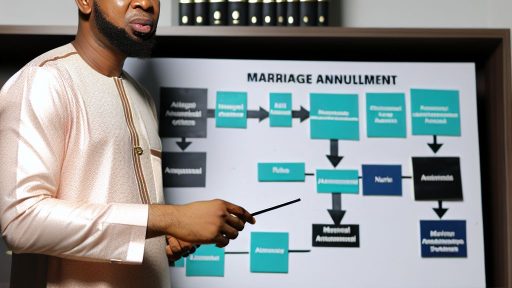Introduction
Understanding marriage laws in Nigeria is crucial for couples planning to marry.
Knowledge of these laws helps protect your rights and responsibilities.
It also aids in preventing legal disputes in the future.
Nigeria recognizes three types of marriages: statutory, customary, and Islamic.
Each type has its rules and regulations.
Types of Marriages Recognized in Nigeria
Statutory marriages follow the Marriage Act.
Couples must register their marriage with the state.
This type provides legal rights and duties under Nigerian law.
Customary marriages adhere to local traditions and customs.
These marriages often require the payment of a bride price.
They must also meet specific cultural practices to be recognized legally.
Islamic marriages follow Sharia law. These marriages involve different rules, including the mahr (dowry).
Registered Islamic marriages are also recognized under Nigerian law.
Each type of marriage has unique implications for property rights and divorce proceedings.
Significance of Marriage Laws
Marriage laws ensure that spouses understand their rights and duties.
They provide a framework for resolving disputes.
These laws also establish inheritance rights, custody arrangements, and property distribution.
Knowing the legal implications can help couples make informed decisions.
Failure to understand can lead to confusion and conflicts in the future.
Understanding the differences between each marriage type is essential.
It allows couples to choose the most suitable option.
Each type offers varying levels of legal protection and recognition.
Couples should seek professional guidance if uncertain about the law.
In essence, familiarity with marriage laws in Nigeria enhances protection for both parties.
It ensures fairness and clarity in relationships.
Before you say “I do,” take the time to understand the legal landscape.
This preparation will contribute to a strong and enduring marriage.
Types of Marriage in Nigeria
Understanding the types of marriage in Nigeria is crucial before tying the knot.
Nigeria recognizes various forms of marriage, each with its own rules and customs.
These include statutory marriage, customary marriage, and Islamic marriage.
This section will explore these marriage types in detail.
Definition and Characteristics of Statutory Marriage
Statutory marriage is the legally recognized marriage in Nigeria.
It follows the Marriage Act of 1970.
This type of marriage is civil in nature, which means it is conducted under the law and requires official registration.
Here are some key characteristics:
- Registration: Couples must register their marriage with the appropriate authority.
- Celebration: The marriage must be conducted by a licensed officiant.
- Eligibility: Both parties must be of legal age and single.
- Legal Obligations: Spouses have legal responsibilities towards each other.
- Rights: Statutory marriage provides legal rights regarding inheritance, custody, and property ownership.
Couples must also undergo a notice period before the marriage.
This notice serves as an announcement of their intention to marry.
It typically lasts for 21 days. After this period, if no objections arise, the couple can proceed with the wedding.
Couples receive a marriage certificate upon completion, which serves as legal proof of their union.
Statutory marriages are structured to protect the rights of both parties.
They provide a clear framework for resolving disputes and ensuring justice, especially in divorce proceedings.
This marriage type upholds principles of equality and consent, which are essential for modern relationships.
Overview of Customary Marriage and Its Variations Across Different Ethnic Groups
Customary marriage is another prevalent type of marriage in Nigeria.
This marriage form is governed by the customs of various ethnic groups.
The rules and practices differ based on cultural backgrounds.
Here is an overview of some key aspects:
- Custom and Tradition: Each ethnic group has its unique marriage customs.
- Notable Practices: Practices can include bride price, traditional rituals, and community involvement.
- Registration: While registration may not be mandatory, it is advisable for legal recognition.
- Adulthood: Customs often define age and maturity for marriage differently.
- Polygamy: Some cultures allow polygamy, while others do not.
In the Igbo culture, for instance, the bride price is essential before marriage takes place.
It signifies respect for the bride’s family and her integration into the groom’s family.
The Yoruba culture emphasizes elaborate ceremonies, often with music and dance.
Meanwhile, the Efik culture may host traditional rites that last several days, with feasting and celebration.
Customary marriage often involves the extended family, emphasizing communal ties.
Families play a vital role in negotiating terms, organizing ceremonies, and providing support.
While customary marriage reflects deep cultural roots, it also faces challenges.
Issues such as women’s rights and gender equality are currently being discussed, with many advocating for changes that protect the interests of women.
Explanation of Islamic Marriage and Its Adherence to Islamic Law
Islamic marriage operates under the principles laid out in Islamic law, known as Sharia.
This marriage form is recognized in Nigeria, especially in predominantly Muslim regions.
Here are the notable features of Islamic marriage:
- Contract: Marriage is seen as a contract between two parties.
- Mahr: The groom must provide a dowry to the bride, known as Mahr.
- Witnesses: At least two witnesses must be present during the marriage ceremony.
- Consent: Both parties must provide free and informed consent to the marriage.
- Polygamy: Islam permits a man to have up to four wives under certain conditions.
Islamic marriage ceremonies, known as Nikah, often incorporate religious rituals, including prayers and blessings.
The families of both the bride and groom play critical roles throughout this process.
Mahr signifies the groom’s commitment to the bride, forming an important part of the marriage contract.
While Islamic marriages celebrate numerous traditions, they also uphold legal principles.
Couples often prepare a marriage certificate, which can act as legal evidence of their union.
This helps to provide clarity on rights and responsibilities in case of disputes or divorce.
In many cases, Islamic couples might also choose to register their marriage under Nigerian law.
This dual registration provides additional protection and rights, covering various aspects of their married life.
Therefore, understanding the types of marriage in Nigeria is essential for anyone considering saying “I do.”
Statutory marriage offers a legal framework, while customary marriage reflects cultural traditions.
Islamic marriage provides insight into the practices and principles outlined in Islamic law.
Each marriage type carries its unique characteristics, challenges, and benefits.
Couples should carefully consider their options and the legal implications of each type before committing to a life together.
Legal Requirements for Statutory Marriage
Age Requirements for Marriage Under Nigerian Law
Nigerian law establishes specific age requirements for marriage.
The minimum age for a statutory marriage is 18 years.
Both parties must consent to this union freely.
The law considers anyone below this age to be a minor.
Minors cannot lawfully enter into a marriage without parental consent.
In Islam, however, different age considerations may apply.
Some interpretations permit marriage at a younger age.
Nonetheless, national laws supersede religious tenets in statutory cases.
It’s crucial to check both civil and religious laws before proceeding with the marriage.
Parties intending to marry should also be aware of their eligibility.
The law prohibits marriages between close relatives.
These include blood relations, such as siblings, parent-child relationships, and some extended family ties.
Violating these regulations can invalidate the marriage.
Documentation Needed for a Valid Statutory Marriage
Preparing the necessary documents is a crucial step in the marriage process.
The primary documents required include:
- Birth Certificates: Both parties must present original birth certificates.
These verify the age of both individuals. - Valid Identification: Acceptable forms include passports, national IDs, or driver’s licenses.
These serve to confirm identity and citizenship. - Passport Photographs: Recent passport-sized photographs are often required.
These help in the registration process. - Letter of Consent: If either party is below 21 years, they must provide a letter of consent.
This document should come from both parents or legal guardians. - Certificate of No Impediment: This certificate confirms that both parties are free to marry.
Usually, it is issued by relevant authorities.
Gathering these documents in advance helps streamline the marriage process.
Both individuals should double-check requirements with the marriage registrar.
Different states might have specific requirements or additional documentation.
The Role of the Marriage Registrar and the Process Involved
The marriage registrar plays a crucial role in the statutory marriage process.
This official ensures all legal requirements are fulfilled before issuing a marriage certificate.
Couples must visit the local registry to begin.
Here’s the process:
- Application Form: Couples fill out a form at the registry, providing personal information like names, ages, and occupations.
- Submission of Documents: After completing the form, couples submit the required documents.
The registrar verifies them for authenticity. - Notice of Marriage: The registrar issues a notice of marriage, publicly posted for 21 days, allowing objections if any exist.
- Interview Process: Couples may attend a brief interview with the registrar to ensure they understand the implications of marriage.
- Schedule the Wedding Day: After completing the steps, couples schedule their wedding date, coordinated by the registrar.
- Marriage Ceremony: On the set date, the couple declares their intentions before the registrar and witnesses.
An officiant is provided. - Issuance of Marriage Certificate: After the ceremony, the registrar issues a marriage certificate, legally confirming the marriage.
Couples should safeguard their marriage certificate as it’s essential for legal processes, like obtaining a passport or name change.
Both parties must verify that their marriage is documented correctly to avoid future complications.
Generally, understanding statutory marriage in Nigeria may seem overwhelming.
However, by following the proper steps and gathering required documents, couples can simplify the process.
The marriage registrar ensures everything runs smoothly, helping couples confidently embark on their new journey.
Proper planning and clear communication are key to a successful marriage process.
Read: Understanding Legal Requirements for Marriage in Nigeria
Understanding Customary Marriage Laws
Role of Traditional Leaders and Community Practices
In Nigeria, customary marriage holds significant cultural importance.
Traditional leaders serve as custodians of customs and practices.
They play a vital role in sanctioning marriages within their communities.
These leaders often include village heads, chiefs, and elders.
Their presence lends legitimacy to the marriage ceremony.
Community practices shape the marriage process.
Each ethnic group has distinct customs that govern marriage.
These cultural variations reflect the rich diversity within Nigeria.
Couples must adhere to specific rituals recognized in their communities.
Compliance with these traditions ensures acceptance and support from family and friends.
Customary Rites and Ceremonies
Several essential rites and ceremonies validate a customary marriage.
These include:
- Introduction Ceremony: This event introduces the couple’s families.
Families discuss marriage intentions and expectations here. - Bride Price (Dowry): Payment of dowry is a customary practice.
The groom provides a sum of money or goods to the bride’s family. - Traditional Engagement: This ceremony seals the marriage agreement.
Both families come together to exchange gifts and blessings. - Ritual Offerings: Certain cultural groups require offerings to ancestors.
These offerings serve to seek blessings for the couple. - Blessing by Elders: Elders often bless the couple during the ceremony.
Their blessings signify approval and an enduring union.
Importance of Consent in Customary Marriages
Consent stands as a cornerstone of customary marriages.
Without mutual consent, a marriage lacks legitimacy.
Here’s how consent is typically obtained:
- Discussion between Families: Before any ceremony, families discuss the marriage.
This step is crucial to ascertain mutual agreement. - Couple’s Consent: Both parties must willingly agree to marry.
Their willingness is monitored during the ceremonies. - Community Witnessing: Community members often witness the agreement.
This public acknowledgment reinforces the commitment. - Rejection by Family: If the bride’s family disapproves, the marriage is typically nullified.
Family consent remains fundamental in these traditions.
Understanding customary marriage laws in Nigeria is essential for couples.
Knowledge of these practices ensures a successful and culturally appropriate union.
Couples must engage with traditional leaders and abide by community customs.
Consent must be prioritized throughout this process.
Ultimately, these steps foster a strong familial bond and community support.
Customary marriage laws provide the framework that governs relationships in many Nigerian societies.
Read: Navigating Cultural Differences for A Successful Nigerian Marriage
Islamic Marriage Laws in Nigeria
Overview of the Islamic Legal Framework Governing Marriages
Islamic marriage laws in Nigeria are influenced primarily by Sharia law.
These laws play a crucial role in regulating marriage practices among Muslims.
The Islamic legal framework upholds specific guidelines regarding marriage, rights, and responsibilities of spouses.
It is essential to understand these principles before entering into wedlock.
The marriage contract, known as the Nikah, serves as the foundation of an Islamic marriage.
The contract is a binding agreement between two parties, the groom and the bride.
This contract outlines the terms and conditions of the marriage.
It also includes stipulations regarding the Mahr, which is the obligatory gift given by the groom to the bride.
Requirements for a Valid Islamic Marriage
Several requirements must be met for an Islamic marriage to be considered valid under Sharia law.
These include:
- Mahr: This is a crucial element in Islamic marriages.
The groom must provide a Mahr, or bridal gift, to the bride.
This amount can vary based on factors like the groom’s financial capacity and local customs. - Witness Requirements: An Islamic marriage requires the presence of at least two male witnesses or one male and two female witnesses.
These witnesses must be of sound mind and not related to either party. - Consent: Both parties must provide clear and willing consent to the marriage.
This consent is vital for the legality of the contract. - Capable Guardians: In many cases, the bride’s guardian, usually her father, must give his consent to the marriage.
This requirement emphasizes familial involvement in marriage decisions. - Legal Age: The bride and groom must meet the minimum age requirements according to local laws and custom before they can marry.
This age may vary by region.
The Impact of Sharia Law in Northern Nigeria in Relation to Marriage Practices
Sharia law significantly influences marriage practices in Northern Nigeria.
The implementation of Sharia governs various aspects of life, including family law.
Here is how Sharia law impacts marriage in this region:
- Marriage Registration: In Northern Nigeria, marriages often do not require formal registration under the Civil Marriage Act.
Instead, the Nikah ceremony suffices, but registering the marriage can offer legal protection. - Polygamy: Islamic law permits a man to have up to four wives.
However, he must treat all wives fairly and provide for them adequately. - Divorce Procedures: Sharia law provides clear guidelines on divorce in Islamic marriages.
Men can initiate Talaq (divorce), while women typically must seek a Khula (divorce) through a Sharia court. - Child Custody: In cases of divorce, custody of children generally favors the mother until they reach a certain age, depending on gender.
- Dispute Resolution: Sharia courts address marital disputes and grievances, providing an alternative to civil courts.
- Societal Norms: The adherence to Sharia law shapes cultural practices surrounding marriage, ceremonies, and family roles.
Communities often uphold these societal norms rigorously.
The unique dynamics of marriage in Islamic contexts necessitate an understanding of these laws.
Both parties entering the marriage must grasp their rights and obligations.
Knowing the requirements and framework is crucial to a successful marital union.
In short, the Islamic marriage laws in Nigeria, particularly in the Northern regions, highlight the importance of adhering to religious and cultural standards.
Couples must familiarize themselves with legal prerequisites to navigate their marriage successfully.
By understanding these laws, both partners can ensure a strong foundation built on mutual respect, love, and adherence to religious principles.
Read: How Nigerian Marriages Shape Family Dynamics in 2024

Marriage Registration and Its Importance
In Nigeria, marriage registration represents a significant step toward formalizing a union.
Couples must understand this process and its importance.
This section elucidates the process and benefits of marriage registration and discusses the legal implications associated with not registering a marriage.
Understanding the Marriage Registration Process
Registering a marriage in Nigeria requires following specific steps.
Couples can start by choosing the type of marriage they intend to undertake.
The two common types of marriage in Nigeria are the customary and civil marriage.
- Gather Required Documents: Couples must collect all necessary documents.
This includes birth certificates, passport photographs, and identification forms. - Notification of Marriage: The couple must notify their local marriage registry.
This notification must occur at least 21 days before the wedding date. - Attend a Pre-Marriage Interview: The couple will attend an interview at the registry office to verify their eligibility.
The interviewing officer assesses the couple’s understanding of marriage. - Obtain a Marriage License: Upon successful verification, the couple receives a marriage license.
This license permits them to conduct the marriage ceremony. - Conduct the Wedding Ceremony: After obtaining the license, the couple can marry.
The wedding must take place in the presence of a registered officiant. - Register the Marriage: Lastly, the couple must register the marriage within a specified period.
They submit the signed marriage certificate to the registry.
Benefits of Registering a Marriage
Marriage registration offers numerous benefits.
Understanding these advantages is crucial for couples.
Here are some of the key benefits:
- Legal Recognition: Registered marriages enjoy full legal recognition in Nigeria.
This recognition establishes the marriage as valid under the law. - Access to Marriage Benefits: Couples can access various benefits, such as tax relief and pension rights.
This access can substantially impact financial planning. - Protection of Rights: Registration protects the rights of both spouses.
This protection includes property rights and rights related to children born of the marriage. - Facilitates Legal Action: A registered marriage serves as evidence in legal cases.
This documentation can assist during disputes or when seeking divorce settlements. - Inheritance Rights: Inheritance laws favor registered marriages.
Registered spouses have clear rights regarding property and assets in the event of a partner’s death.
Legal Implications of Not Registering a Marriage
Failing to register a marriage can lead to serious legal complications.
Couples may encounter various challenges and obstacles.
The following outlines the main legal implications:
- Lack of Legal Protection: Unregistered spouses lack legal protection.
This absence can lead to complications in matters of property ownership and inheritance. - Challenges in Divorce Proceedings: In the event of a divorce, unregistered marriages face numerous difficulties.
Courts may question the validity of the union. - Custody Issues: Custody battles can become complicated.
Courts may not recognize the marriage while deciding on custody of children born from the union. - Limited Access to Benefits: Couples may miss out on legal benefits.
Such benefits include inheritance rights, tax breaks, and health insurances. - Impact on Children’s Legitimacy: Children born from unregistered marriages may face challenges.
They often encounter issues related to legitimacy and inheritance rights.
How Registration Impacts Property Rights, Inheritance, and Legal Recognition
Marriage registration plays an essential role in establishing property rights and inheritance laws.
The legal recognition of a registered marriage signifies that both partners are equally entitled to property acquired during their union.
- Property Rights: Registered spouses hold equal rights to marital property.
This equality ensures that both partners are considered joint owners of the property. - Inheritance Matters: Inheritance laws prioritize registered marriages.
Unregistered spouses may face disputes regarding the deceased partner’s estate. - Next of Kin Status: Registered spouses automatically become legal next of kin.
This status is crucial for making medical and legal decisions during emergencies. - Tax Benefits: Couples in registered marriages can benefit from tax allowances.
These allowances can lead to increased savings over time. - Simplicity in Legal Procedures: A registered marriage simplifies legal processes.
It provides necessary documentation during legal proceedings, thus expediting resolution.
Understanding Nigerian marriage laws is indispensable for couples preparing to tie the knot.
Marriage registration offers numerous benefits, including legal protection and access to vital rights.
Conversely, failing to register can lead to significant hurdles in personal and legal matters.
Couples must prioritize formalizing their marriage through registration to ensure a secure future together.
By registering their marriage, couples not only affirm their commitment but also safeguard their rights.
This meticulous approach lays a strong foundation for a prosperous and harmonious marital life.
Read: Testimonials: Couples Share Their Marriage Form Experiences
Rights and Responsibilities of Spouses
Legal Rights of Husband and Wife Under Nigerian Law
Nigerian law provides distinct legal rights for spouses in marriage.
Both partners hold equal rights in the union.
This equality stems from the Marriage Act and other legal frameworks.
The responsibilities and rights largely depend on the type of marriage.
- Right to Property: Both spouses have rights to jointly acquired property.
- Right to Inheritance: Spouses inherit from each other when one passes.
- Right to Maintenance: Each spouse is entitled to financial support.
- Right to Child Custody: Both spouses have rights regarding their children’s welfare.
- Right to Consent: Each partner must consent to major decisions, like moving or resettling.
Responsibilities Towards Each Other
Alongside their rights, spouses have significant responsibilities.
These obligations ensure a balanced and fair partnership.
- Financial Obligations: Each partner must contribute to household expenses.
- Emotional Support: Spouses should offer emotional and psychological support.
- Child Care: Both are responsible for raising and providing for children.
- Health Care: Spouses should take care of each other’s health needs.
- Respect and Trust: Mutual respect and trust form the foundation of a healthy marriage.
Spousal Abuse and Legal Recourse Available
Spousal abuse remains a critical issue in many marriages.
Nigerian law recognizes abuse as a serious crime.
It underscores the importance of protecting victims of such abuse.
There are several forms of spousal abuse, including physical, emotional, and economic abuse.
Physical abuse involves any form of violence, while emotional abuse includes manipulation and intimidation.
Economic abuse limits a spouse’s access to finances, disregarding their independence.
Legal Protection and Recourse
Victims of spousal abuse in Nigeria have legal options.
The Violence Against Persons (Prohibition) Act provides a framework for protection.
This Act criminalizes all forms of domestic violence.
It aims to prevent abuse and protect victims through legal measures.
- Reporting to Authorities: Victims can report abuse to the police.
- Protection Orders: Courts can issue protection orders to keep abusers away.
- Legal Aid: Organizations provide legal aid to help victims navigate the process.
- Counseling Services: Access to counseling can aid recovery for victims.
- Support Groups: Various support groups exist to help those affected by abuse.
It is crucial for victims to know their rights under Nigerian law.
Understanding these rights can empower them to seek help.
Furthermore, it helps in fostering a supportive environment for victims to speak out against abuse.
The Role of Community and Family
Community and family play essential roles in addressing spousal abuse.
Families should foster open conversations about relationships.
They can provide emotional support and offer safe spaces for victims to discuss their experiences.
Communities can initiate educational programs on marriage rights and responsibilities.
Awareness campaigns can promote healthy relationships.
This effort will create an environment in which abuse is less tolerated and victims feel safe to seek help.
Encouraging bystanders to intervene during domestic confrontations can also help.
Training community members on how to support victims increases collective accountability.
Communities can create networks that comfort and assist those in distress.
Building Healthy Marriages
Understanding rights and responsibilities contributes to building healthy marriages.
Couples should communicate openly about their needs and expectations.
Regular discussions about finances, responsibilities, and child-rearing enhance partnership.
Couples should also attend marriage counseling if facing difficulties.
Professional help can provide insights into improving the relationship.
Investing time in strengthening the relationship can prevent abuse and dissatisfaction from escalating.
In a nutshell, understanding the rights and responsibilities within marriage is vital.
Knowledge empowers spouses to advocate for their rights.
Additionally, it enables them to fulfill their duties with care and commitment.
Nigerian marriage laws emphasize equality, respect, and protection.
Each spouse should strive to uphold these values as they build their lives together.
By fostering healthy relationships, couples can create a loving environment for themselves and their children.
Common Legal Challenges in Nigerian Marriages
Nigerian marriages come with unique legal challenges.
Understanding these issues can help couples navigate their lives more effectively.
Here, we explore common challenges related to polygamy, divorce, and inheritance disputes.
Polygamy Issues
Polygamy is a significant issue within Nigerian marriages. The country recognizes both monogamous and polygamous unions under different laws.
- Legal Framework: The Marriage Act governs monogamous marriages, while customary laws cover polygamous unions.
- Consent Requirements: For polygamy, the first wife’s consent may be required.
This can cause tension in relationships. - Rights of Spouses: Legal rights differ between wives in traditional and monogamous marriages.
Understanding these rights is essential. - Children’s Rights: Children from polygamous marriages may face disputes regarding inheritance and custody.
Couples should openly discuss their marital expectations.
Clarity about the nature of their union can prevent disputes.
Additionally, consulting a legal expert can help navigate the complexities of polygamous relationships.
Divorce Proceedings
Divorce represents another prevalent challenge in Nigerian marriages.
The process varies significantly depending on the type of marriage.
- Types of Divorce: There are two main divorce processes: judicial and statutory divorce.
- Grounds for Divorce: Grounds for divorce may include adultery, cruelty, or irreconcilable differences.
- Judicial Process: Couples must initiate proceedings in court, which can be lengthy and contentious.
- Division of Assets: Determining how to split assets can lead to significant legal battles.
- Child Custody and Support: Disputes often arise over the custody of children and financial support.
To navigate divorce effectively, couples should seek legal counsel.
Understanding one’s rights can significantly impact the outcome of the process.
Mediation may also help resolve disputes amicably.
Inheritance Disputes
Inheritance disputes often arise post-marriage.
Nigerian laws on inheritance vary widely depending on customary and statutory laws.
- Intestate Succession: When a spouse dies without a will, intestate succession laws apply.
This can create confusion and disputes. - Wills and Testaments: Couples should consider creating wills to clarify inheritance wishes.
- Children’s Rights: Children born out of wedlock may face challenges in claiming inheritance.
- Gender Inequality: Cultural practices may disadvantage female heirs, leading to legal battles.
To safeguard their interests, couples must engage in legal planning.
Creating wills can help address potential disputes.
Consulting with a legal professional ensures that your wishes are clearly stated and recognized by law.
Navigating Legal Disputes
Facing legal disputes in marriage can be overwhelming.
However, certain strategies can help couples navigate these challenges effectively.
- Open Communication: Honest discussions about expectations and concerns can preempt legal issues.
- Seek Legal Expertise: Consulting a lawyer before getting married or during disputes can provide clarity.
- Mediation Services: Utilizing mediation services allows couples to resolve disputes amicably.
- Support Networks: Building a support network of family and friends can provide emotional and practical assistance.
Understanding the legal landscape surrounding marriage in Nigeria equips couples to handle challenges effectively.
With the correct knowledge and resources available, couples can reduce potential conflict and promote a healthy, peaceful union.
Resources for Couples Facing Legal Challenges
Couples facing legal challenges have access to various resources.
These can help them navigate the complexities of Nigerian marriage laws.
- Legal Aid Organizations: Organizations often provide free or low-cost legal assistance to those in need.
- Marriage Counseling Services: Professional counselors can help couples address foundational issues before they escalate.
- Online Resources: Websites such as the National Human Rights Commission offer insights into marital rights and responsibilities.
- Community Legal Clinics: Many communities host legal clinics aimed at educating individuals about their rights.
Accessing these resources can empower couples.
Knowledge about legal rights can alleviate the stress associated with marital issues.
With the right guidance, couples can approach their marriages and legal responsibilities with confidence.
Conclusion
Understanding Nigerian marriage laws is crucial for every couple planning to marry.
Knowledge of these laws helps prevent potential legal disputes.
Couples must recognize that marriage is more than a ceremony; it creates legal obligations and rights.
Adhering to Nigerian marriage laws ensures that both partners understand their roles and responsibilities.
It lays the groundwork for a healthy marital relationship.
Furthermore, it provides clarity on issues such as property rights, child custody, and divorce.
Couples must navigate these legal waters to safeguard their interests.
Before tying the knot, couples should seek legal advice.
A qualified legal professional can explain the intricacies of marriage laws.
This guidance helps couples make informed decisions and clarify misconceptions.
Legal advice can also assist in drafting a marriage contract, should that be necessary.
Additionally, awareness of legal requirements simplifies the marriage process.
It reduces the chances of facing unexpected challenges later.
By understanding the requirements for both civil and customary marriages, couples can achieve a seamless transition into married life.
Final thoughts on the impact of law on marriage are significant.
Laws shape the framework of family stability in Nigeria.
A solid legal foundation strengthens the institution of marriage and fosters respect among partners.
Understanding legal provisions promotes healthier marital relationships and contributes to family cohesion.
Ultimately, knowledge and adherence to Nigerian marriage laws can empower couples.
It protects their rights and fosters a supportive environment for their family.
Couples must prioritize this understanding as they embark on their marital journey.




